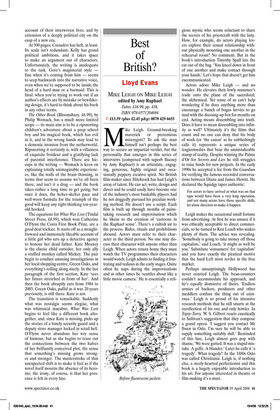Best of British?
Lloyd Evans
MIKE LEIGH ON MIKE LEIGH edited by Amy Raphael Faber, £16.99, pp. 438, ISBN 978-0571204694 ✆ £13.59 (plus £2.45 p&p) 0870 429 6655 Mike Leigh. Ground-breaking maverick or pretentious miseryguts? To ask the man himself isn’t perhaps the best way to secure an impartial verdict, but the personality that emerges in this series of interviews (composed with superb fluency by Amy Raphael) is an articulate, engaging, generous, highly original and occasionally peppery creative spirit. No British film-maker since Hitchcock has had Leigh’s array of talent. He can act, write, design and direct and he could easily have become one of the industry’s most bankable players had he not doggedly pursued his peculiar working method. He doesn’t use a script. Each film is built up through months of painstaking research and improvisation which he likens to the creation of ‘cartoons in the Raphael sense’. There’s a cultish air to the process. Rules, rituals and prohibitions abound. Actors must refer to their character in the third person. No one may discuss their character with anyone other than Leigh. When actors return home they must watch the TV programmes their characters would watch. Leigh admits to finding it frustrating and tedious in the early stages. Quite often he naps during the improvisations and at other times he ‘scuttles about like a little movie camera.’ He is essentially a reli gious mystic who seems reluctant to share the secrets of his priestcraft with the laity. How, for example, do actors playing lovers explore their sexual relationship without physically mounting one another in the rehearsal room? No comment. But in the book’s introduction Timothy Spall lets the cat out of the bag. ‘You kneel down in front of one another and make contact through your hands.’ Let’s hope that doesn’t get him excommunicated.
Actors adore Mike Leigh — and no wonder. He elevates their lowly mummer’s trade onto the plane of the sacerdotal, the alchemical. Yet some of us can’t help wondering if he does anything more than encourage a bunch of bogus luvvies to go mad with the dressing-up box for months on end. Acting means dissembling into truth. Does it have to mean dissembling into infinity as well? Ultimately it’s the films that count and no one can deny that his body of work (or ‘the canon’ as he unblushingly calls it) represents a unique series of tragicomedies that bear the unmistakeable stamp of reality. Despite winning the Palme d’Or for Secrets and Lies he still struggles to raise funds for new projects. In the early 1990s he accepted a fee from the Guardian for verifying the famous recorded conversations between Diana and James Hewitt. He declared the Squidgy tapes authentic:
For actors to have arrived at what was on that tape would have been a very long operation, and not many actors have those specific skills, let alone directors to make it happen.
Leigh makes the occasional small fortune from advertising. At first he was unsure if it was ethically acceptable to direct commercials, so he turned to Ken Loach who makes plenty of them. The advice was revealing. ‘Somebody is going to take money off those capitalists,’ said Loach, ‘it might as well be you.’ Substitute ‘consumers’ for ‘capitalists’ and you have exactly the piratical motive that the hard Left most reviles in the free market.
Perhaps unsurprisingly Hollywood has never courted Leigh. The bean-counters couldn’t accommodate his approach, and he’s equally dismissive of theirs. ‘Endless armies of backers, producers and other meddlers confuse the thing out of existence.’ Leigh is so proud of his intensive research methods that he still smarts at the recollection of his one and only howler. In Topsy-Turvy, W. S. Gilbert reacts caustically to Sullivan’s suggestion that they compose a grand opera. ‘I suggest you contact Mr Ibsen in Oslo. I’m sure he will be able to supply something suitably dull.’ Reminded of this line, Leigh almost goes pop with shame, ‘We were gutted. It was a stupid mistake. A gaffe. A blunder.’ Later he calls it ‘a tragedy’. What tragedy? In the 1880s Oslo was called Christiania. Leigh is, if nothing else, a steely-hearted perfectionist and this book is a hugely enjoyable introduction to his art. For anyone interested in theatre or film-making it’s a must.


















































































 Previous page
Previous page